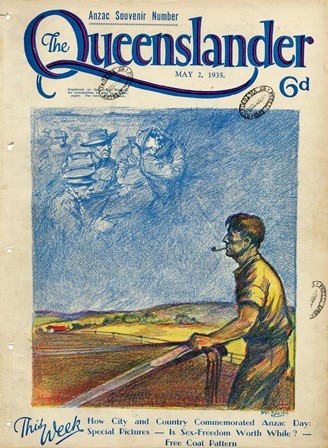
Illustrated front cover from The Queenslander May 2 1935 for blog
Earlier this year on 21 April, just before the 100th anniversary of the Gallipoli campaign, historians Associate Professor Martin Crotty and Mark Cryle joined ABC journalist Ian Townsend in the John Oxley Library reading room to discuss the meaning of ANZAC Day. Rather than focus on the much contested creator or architect of ANZAC day (many claim Queenslander Canon David Garland – for more information on this subject, see Simon Farley's previous blog post), the discussion turned to the notion of commemoration itself and in particular, commemorating the battle of Gallipoli.
The idea of commemoration has been a contested subject from the very beginnings of Anzac Day. What should we do? How should we do it? Why should we do it? Over time the reason for commemoration has changed. This is illustrated clearly in images of Anzac Day processions that, during the war years, also doubled as a recruitment opportunities. As we face the our 99th Anzac Day tomorrow, the way in which we mark this anniversary remains a topic of discussion and debate. Martin Crotty suggested that the meaning of Anzac is not unified nor cohesive - Anzac mythology differs to Anzac history.
Academics and scholars on the topic have sought mostly to provide historical clarity about the realities of WWI, Gallipoli included, whereas the wider community, on the whole and including political and military leaders and establishments, have engaged much more enthusiastically in the ‘mythologising’ of Anzac. There are many reasons for this and too many to mention in this blog post but one must pause for thought. When contemplating national identity, it is undeniable that many Australians feel Gallipoli holds a special significance for them and that this significance is felt deeply. However, to ignore or brush over the historical realities of Gallipoli (or any war) may do a disservice to the memory of those who lost their lives in the service of their country. Perhaps over these next few years as we commemorate those lives forever changed by WWI, both on the battlefield and at home, we try to foster a greater understanding about the divergent meanings we have given to Anzac Day and commemoration.
Which Anzac stories are important to retell, and how will a new generation of Australians identify with them? Join us on October 13-14 for the next Q ANZAC 100: Memories for a New Generation symposium, How we remember, as we discuss the theme of commemoration and remembering.
Comments
Your email address will not be published.
We welcome relevant, respectful comments.